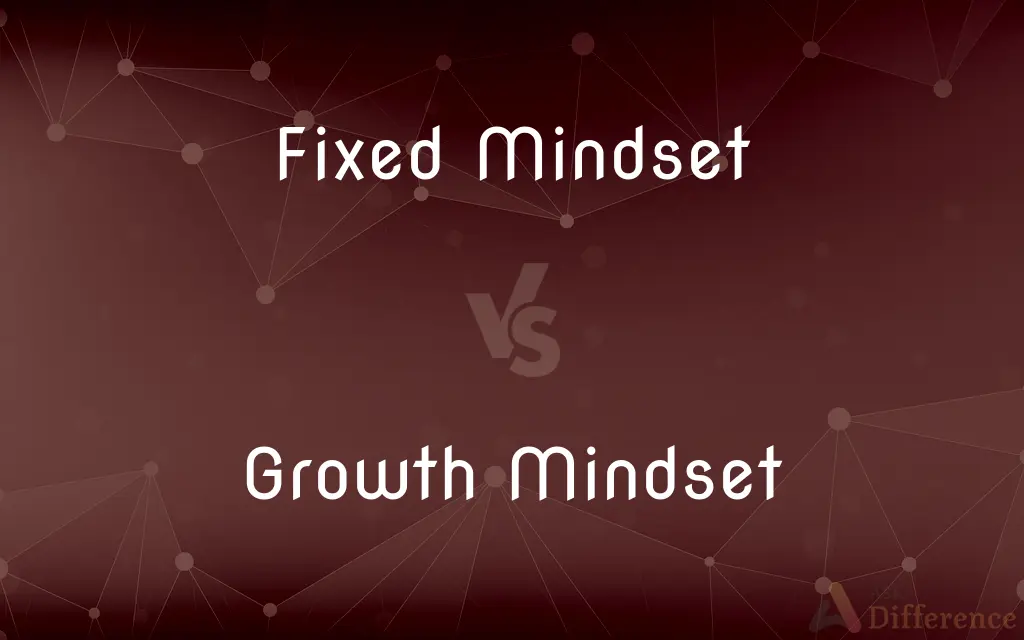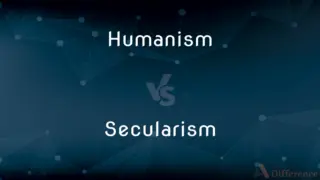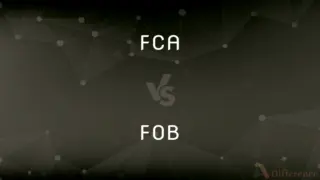Fixed Mindset vs. Growth Mindset — What's the Difference?
By Maham Liaqat & Urooj Arif — Published on March 2, 2024
Fixed Mindset sees intelligence as static, leading to a desire to look smart; Growth Mindset believes in the development of intelligence, fostering a love for learning.

Difference Between Fixed Mindset and Growth Mindset
Table of Contents
ADVERTISEMENT
Key Differences
A Fixed Mindset assumes that our intelligence, talents, and abilities are innate and unchangeable. Individuals with this mindset may avoid challenges, fearing failure could reflect on their inherent abilities. Conversely, a Growth Mindset is the belief that these attributes can be developed through dedication and hard work. This perspective embraces challenges as opportunities for growth.
People with a Fixed Mindset are likely to give up easily when confronted with obstacles, viewing them as insurmountable due to their perceived fixed abilities. In contrast, those with a Growth Mindset persevere through difficulties, seeing them as a means to extend their abilities and increase their intelligence.
Feedback and criticism are often taken personally by individuals with a Fixed Mindset, seeing it as an attack on their core abilities. However, someone with a Growth Mindset values constructive criticism as essential feedback for learning and improving.
The desire for approval is stronger in those with a Fixed Mindset, leading them to choose tasks they know they can succeed in to uphold their image. Growth Mindset individuals, however, are motivated by their own progress, engaging in tasks that challenge them, even if success isn't guaranteed.
Success of others can provoke jealousy and feel threatening to someone with a Fixed Mindset, as it can highlight their own limitations. Meanwhile, a person with a Growth Mindset finds inspiration in the success of others, seeing it as an opportunity to learn and grow themselves.
ADVERTISEMENT
Comparison Chart
View on Intelligence
Static and unchangeable
Can be developed
Approach to Challenges
Avoids, fearing failure
Embraces as opportunities
Reaction to Obstacles
Gives up easily
Persists and sees as growth chance
Feedback and Criticism
Takes personally
Views as essential for improvement
Success of Others
Feels threatened and jealous
Finds inspiration and learning opportunities
Compare with Definitions
Fixed Mindset
Belief that abilities are innate and immutable.
She avoided new challenges, fearing they'd prove her talent was limited.
Growth Mindset
Finds inspiration in the success of others.
Seeing a colleague succeed, she was motivated to learn how she could improve.
Fixed Mindset
Sees feedback as personal criticism.
He felt discouraged by the critique, seeing it as an attack on his intelligence.
Growth Mindset
Believes abilities can be developed through hard work.
He embraced difficult projects as opportunities to enhance his skills.
Fixed Mindset
Avoids challenges to not fail.
He chose tasks within his comfort zone to maintain his image of success.
Growth Mindset
Values feedback for learning and improvement.
She appreciated constructive criticism, using it to better her performance.
Fixed Mindset
Feels threatened by others' success.
Her peer's achievement made her question her own abilities, feeling inferior.
Growth Mindset
Embraces challenges as opportunities to grow.
She sought out challenging tasks to push her limits and learn.
Fixed Mindset
Gives up easily when faced with difficulties.
Faced with a complex problem, she quickly concluded it was beyond her inherent capabilities.
Growth Mindset
Persists in the face of setbacks.
Despite initial failures, he continued working, believing in his ability to improve.
Common Curiosities
Why is a Growth Mindset important?
It fosters resilience, a love for learning, and a willingness to tackle challenges, contributing to personal and professional growth.
What is a Growth Mindset?
The belief that intelligence and abilities can be developed through dedication, effort, and learning.
Can someone switch from a Fixed to a Growth Mindset?
Yes, with awareness and effort, individuals can adopt a Growth Mindset by embracing challenges and learning from feedback.
How does a Fixed Mindset affect learning?
It can limit learning and growth opportunities as individuals may avoid challenges and give up easily when faced with difficulties.
What is a Fixed Mindset?
A belief that intelligence and talents are innate and fixed traits that cannot be developed.
How does a Growth Mindset enhance performance?
By valuing effort and learning from mistakes, individuals improve their abilities and achieve higher levels of success.
Can a Growth Mindset be taught?
Yes, through teaching strategies that emphasize effort, encourage challenges, and value the process of learning.
Do people with a Growth Mindset always succeed?
While not always, they are more likely to persevere through challenges and learn from failures, increasing their chances of success.
Why do those with a Growth Mindset value criticism?
They view criticism as an opportunity to learn and improve, rather than as a personal attack.
Is it possible to have a mixture of both mindsets?
Yes, many people exhibit traits of both mindsets in different areas of their lives or when faced with different tasks.
What role does effort play in a Growth Mindset?
Effort is seen as a path to mastery and improvement, essential for developing new skills and intelligence.
How can teachers promote a Growth Mindset in students?
By praising effort, encouraging resilience, and emphasizing the value of challenges and mistakes as learning opportunities.
Does having a Growth Mindset guarantee success?
While not a guarantee, it significantly increases the likelihood of overcoming obstacles and achieving personal goals.
How does a Fixed Mindset impact one's view of effort?
Effort may be seen as futile if abilities are considered unchangeable, leading to a lack of motivation to try harder in the face of challenges.
How does feedback affect those with a Fixed Mindset?
They may see feedback as a negative reflection on their abilities, discouraging them from attempting further challenges.
Share Your Discovery

Previous Comparison
Humanism vs. Secularism
Next Comparison
FCA vs. FOBAuthor Spotlight
Written by
Maham LiaqatCo-written by
Urooj ArifUrooj is a skilled content writer at Ask Difference, known for her exceptional ability to simplify complex topics into engaging and informative content. With a passion for research and a flair for clear, concise writing, she consistently delivers articles that resonate with our diverse audience.













































